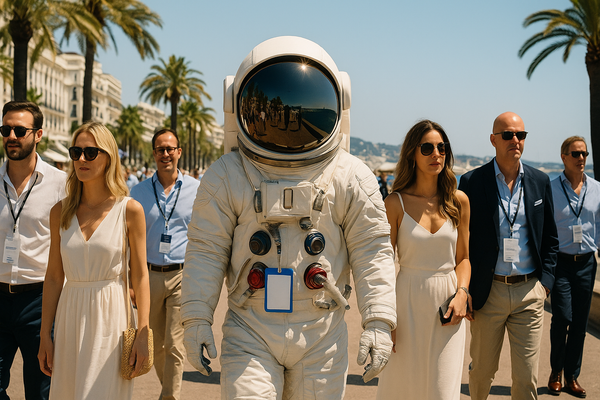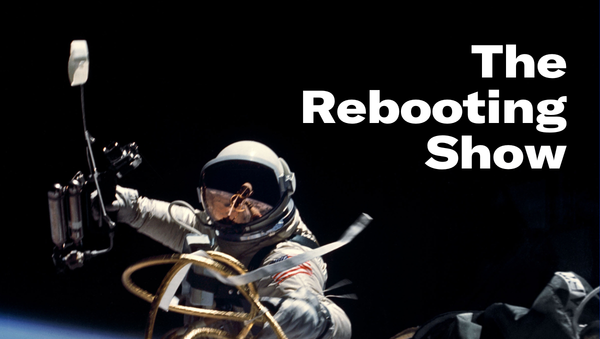The messy end of the pageview economy
Shoes to drop, decisions to be made

New York City in early June is undefeated. Last night, I went to a Tech Week gathering at the Axel Springer Haus on a quiet street in Nolita. It’s a great space: a townhouse with multiple floors and enough space for a small corporate team to work and gatherings to be held with a rare Manhattan backyard. The vibe was a bit muted, considering the cutbacks at Business Insider and the general tenor of the industry.
The awkward reality of the media business is it’s still a business, even when layoffs happen, so the gatherings go on. I expect many publishers to be in a pickle with their Cannes plans. They are enacting austerity policies at home and the optics of the Riviera are rough. Might want to chill on the Instas. One exec stressed to me they were flying economy to Geneva and doing a change. I had one Cannes live podcast scrapped out of risk it would be incongruous with cuts being made at home.
The Great Cannes Debate about whether it’s a boondoggle or useful should be handled in the spreadsheets. Publishers I talk to track whether the big spending there results in deals. One exec I texted to see if they would be going groused that they blew $400,000 last year for no returns. I took that as a no. On the other hand, WSJ CRO Josh Stinchcomb said the Journal House in Cannes is a profit center. Some like Axel Springer are downsizing their approaches. The Axel Springer Haus in Cannes has been replaced by partnering with others. Many will send only a few sales and business development executives.
(One Cannes tip for flinty publishers: Stay outside of Cannes and commute. It’s actually better for mental health, too. I’m staying in Antibes and taking the train with the Cote d’Azur rush hour crowd. The superyacht salespeople need to work like the rest of us. Respect all labor.)
The Rebooting has not abandoned Cannes in favor of austerity measures. We are doing a series of small activations there that will gather top executives, including the Media Leaders Dinner. I want to highlight one in particular: On Thursday, June 20, we are doing a live recording of the People vs Algorithms podcast with special guests: Dotdash Meredith CEO Neil Vogel and Axios media correspondent Sara Fischer. They'll join me and Troy Young to discuss an optimistic but realistic view of the path ahead for publishers. We will also have drinks and the typical Riviera nibbles like cheese puffs. Register here.
Also, if you’re going to Cannes or are just Cannes curious or a Cannes loather, sign up to get text messages from me during the week. I’ll focus squarely on the vibe at Cannes, what I’m hearing in endless meetings, casual conversations and the random gatherings that are going on at all times. I’ll also include tips I’ve gathered from a good 15 times to Cannes. I’m doing this with Subtext, a service that lets publishers use texting as a broadcast and engagement tool. I’m interested in trying it out and promise I won’t spam you inane stuff, although inanity is subjective. I’ll also arrange an informal gathering toward the end of the week, probably at my favorite French surf cantina. Sign up.
The end of the pageview economy
The end of the pageview economy is unfolding slowly and then all at once. Google’s addition of AI Mode is the writing on the wall. Anyone using answer engines knows this is a superior option for many searches than wading through a sea of blue links stuffed with SEO slop. The second-order effects on publishers are becoming clear. Some notes on my recent conversations.
Pragmatism has won. Few publishing executives I speak to are sanguine about the deals they’ve struck with AI companies to use their data. It’s more along the lines of how Dotdash Media CEO Neil Vogel told me about its approach: Get a seat at the table, accept that the “stolen” content is gone. Galling? Yes, absolutely. Capituation? Power matters. Mistake? I’m unsure on that one. I love the idea of publishers ripping their shirts off, standing on the table and threatening to fight every LLM in the joint. Yet at this point of life, I’m a realist. Publishers do not have much leverage, not when dealing with companies busying themselves reopening Three Mile Island, doing biz dev with emirates and making $6.5 billion acquihires.
Look no further than The New York Times, which has poured millions of dollars in fighting OpenAI. The thing with litigation is it’s a form of negotiation. It’s a way to establish leverage. The smart move from the Times was to then go on and cut a deal with Amazon. This isn’t hypocrisy. This is listening to a better offer, taking it, and in the meantime establishing more leverage as a pragmatist.
Commerce is the next shoe to drop. The news of the deep cuts at Business Insider were foreboding. BI’s model is a classic pageview machine. CEO Barbara Peng noted 70% of its revenue is tied to traffic. I’ve noticed the new metric to brag about is not Comscore uniques – RIP the days of CNN PR sending monthly press releases on its ComScore numbers – but how low the percentage of revenue a publisher has tied up in pageviews.
Much of that is, of course, the ad business, in particular programmatic advertising. The old formula at many publishers was to optimize for search (and social) and monetize that traffic mostly via programmatic channels. This was complemented by publishers getting into “commerce,” which is really affiliate, which is really SEO arbitrage. BI’s cuts also came with a decision to scotch its affiliate play. The reality is affiliate without SEO is impossible without being in a niche. Generalist publishing brands are in a rough position, and they will inevitably reassess the viability of affiliate operations. The pivot to affiliate always reminded me of the pivot to video. The pivot to video was really a pivot to Facebook. And the pivot to affiliate was really a pivot to SEO.
The wholesale option. I often ask people to look ahead five years and describe their businesses. You’d be surprised how many struggle to present a coherent vision of what they look like. That’s less a lack of strategic foresight and more an honest reflection of where things stand. One media executive who is not exposed to the pageview economy told me their belief that many publishers will become information wholesalers to these centralized AI engines.
This is the scenario the exec posited: Early adopters are already using ChatGPT instead of Google. Google will likely cannibalize its own search business with Gemini. This shift toward AI-native search means even fewer referrals and brand attributions for publishers. Only a few major sites may continue drawing direct traffic, but that list will shrink. The path forward for publishers, especially local news, will be to produce information specifically for AI systems to ingest. This means abandoning legacy ad-based models in favor of creating raw inputs for AI, essentially feeding ChatGPT directly rather than publishing to the open web.
“The first ones who do will at least have a business, if they dramatically reduce expenses tied to legacy operations like ad sales,” the exec said.
Protect Discover at all costs. Google Discover continues to send lots of traffic to publishers. Being good at Discover is a major competitive advantage to those operating pageview models. Google Discover has quietly become the last reliable faucet in the pageview economy. It’s opaque, volatile, and poorly understood.
There’s a line of thinking that Google will use Discover to continue sending enough traffic to publishers to keep them from extinction. It’s something of a subsistence diet of just enough pageview calories. The risk is that the Discover beneficiaries will not take the decisive actions needed to accelerate the business diversification efforts that should have been completed years ago. Not making a decision is a decision, and almost always a bad one.
Thanks for reading. Send me a note with feedback by hitting reply.
For sponsorship opportunities, get in touch: bmorrissey@therebooting.com.




